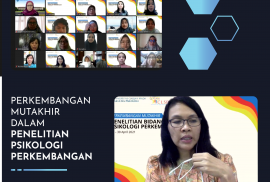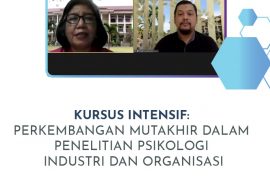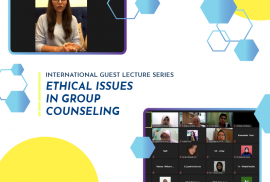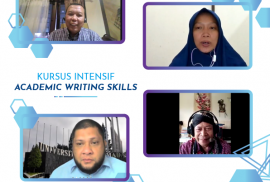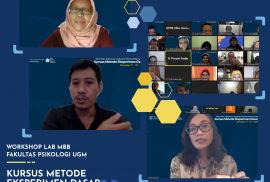Together with the Developmental Psychology Expertise Group, the Psychology Doctoral Program held an intensive course program “Recent Developments in Developmental Psychology Research” which lasted 3 days (28-30/4). Starting with a keynote speech from Dr. Maria Goretti Adiyanti with the topic “Understanding Life Span Development and the Significance of Developmental Research in Various Contexts” on the first day and ended by Pradyta Putri Pertiwi, Ph.D & Aaron Opdyke, Ph.D., CPEng., PE, NER as a speaker on the topic “Inclusion and Role of People with Dissabilities and Older Person in Disaster and Humanitarian Response”. Through this topic, Aaron explained how physical and psychosocial needs intersect, what the psychological impact is, what if there is a role played by the built environment, and how to understand the relationship between physical and psychosocial needs in reducing disaster risk.
Course
The UGM Psychology Doctoral Program with the Organizational Change and Development Expertise Group (KBK) for 3 days (7-9 / 4) days held an Intensive Course on “Recent Developments in Industrial & Organizational Psychology Research”. This event was opened by Dr. Nida Ul Hasanat, M.Si as Deputy Dean of the Faculty of Psychology UGM for Academic and Student Affairs. Nida thanked all those who supported this event, as well as officially opening the event.
Tuesday (23/3) Office of Cooperatian, International Affairs, and Alumni (OCIA) Faculty of Psychology UGM held a guest lecture with the topic “Ethical Issues in Group Counseling”. The event, which was attended by 150 participants, took place from 07.30 WIB to 09.10 WIB. This event is a series of International Guest Lecture Series events held by OCIA this year.
In order to improve scientific writing skills in Indonesian, the UGM Psychology Doctoral Program held an Intensive Academic Writing Skills Course which will take place on Monday (1/3) and Tuesday (2/3) March 2021. The event is divided into four sessions, each of which focuses on the topics of “Scientific Writing is Fun”, “Diagnosis of Writing Ability”, “Writing Process” and “Examples of Simple Writing” were filled in by Drs. Heru Marwata, M.Hum. Through this event, Heru challenges each participant as well as guiding and correcting mistakes made by the participants. In addition, this event also provides a lot of knowledge in writing that can be continuously trained so that in the future it can be even better.
Mulai Senin (15/2), Fakultas Psikologi UGM menyelenggarakan kegiatan “Intensive Course : Multimethod and Mixed Research”. Kegiatan ini diselenggarakan oleh Program Studi Doktor Ilmu Psikologi bekerja sama dengan Center of Life-Span Development (CLSD) yang berlangsung selama tiga hari hingga Rabu (17/2).
After the opening of the Basic Experiment Method Course on Monday, December 7, 2020, Mind, Brain and Behavior Laboratory continue to organize the event on Tuesday, December 8, 2020 to Thursday, December 10, 2020.
Mind, Brain and Behavior Laboratory (MBB Laboratory) Faculty of Psychology UGM conduct Basic Experiment Method Course online. The event was held for 4 days, start on Monday, December 7 to Thursday, December 10, 2020.
Center for Lifespan and Development (CLSD) Faculty of Psychology UGM organize narrative research method course. The event was held for two days, start on Friday, December 4 to Saturday, December 5, 2020.

